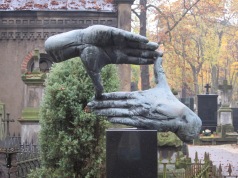• WL100/36: Le songe de Desnos (1938)
Wednesday, 8 May 2013 Leave a comment
When I was preparing for a talk on Lutosławski and French poetry for a Woven Words study day in March, I came across a recording of the voice of the surrealist poet, Robert Desnos (1900-45). Lutosławski turned to Desnos’s poetry on two occasions: for Chantefleurs et Chantefables (1990) and for Les espaces du sommeil (1975) (see also WL100/32: Les espaces, **12 April 1978). But I’d been unaware of Desnos’s passion for the medium of radio and for a series of programmes – La clef des songes (The Key of Dreams/The Dream Book) – in which he was closely involved in 1938-39.
Here’s a surviving excerpt from a radio programme of 1938 in which Desnos himself narrates a dream. It seems uncannily prescient of tape experiments that would be carried out by French composers just ten years later. The transcript is mine (I am very grateful to Michèle Laouenan for helping with the less audible fragments, although a few are still quite difficult to make out. She also identified the opening song as Sur la route de Dijon. Merci Michèle!).
[wind machine]
Desnos: “I find myself suddenly in a strange country where the wind is blowing violently. [music: ‘Sur la route de Dijon’*] We were all in a group, walking and singing. The others were walking very fast. I couldn’t manage to keep up with them, despite my efforts.”
[another male voice] “Wait for me! Wait for me!”
Desnos: “Suddenly…” [animal roar, followed by music (unidentified)] “In front of us, there was…”
[two voices] “But what is that dirty beast [?], a hippopotamus?” “It’s a hippopotamus. Gosh, that’s extraordinary.”
Desnos: “They begin to run away. I couldn’t move my legs any more.”
[another voice] “And, all of a sudden…” [human howling]
Desnos: “I was in the process of stepping on Max Rénier**, who was stretched out on the ground and who was thirty metres long and covered with spots like the body of a giraffe.” [more roaring] “The two hippopotamuses were rushing straight at us and, just as they were going to flatten us, …”. [continued roaring] “I saw from behind my tree a surprising parade. All the wild animals in the world, a real menagerie.”
[more roaring]
“But at that moment a gale blew up. The wind, the rain, the storm, made the wild animals run away.” [wind, followed by music: an excerpt from Wagner’s ‘Tannhäuser’ overture (Venusberg music)] “But the gale had become a gale of music. The forest had become a bathroom.” [‘Tannhäuser’ continues, followed by applause] “People were clapping and yet there was no-one in the room. The applause became deafening. It was like a fusillade.”
[female voice] “Help! Help!”
[male voice] “Help!”
[second female voice] “Come in here, you’re safe. Come here. But come in.”
Desnos: “It was the usher at the concert hall, who shoved us into a padded loge. The loge was a concrete shelter where all the spectators found themselves again, packed like sardines. Above us, the concert hall was collapsing, the firing continued.” [crowd noises] “In the shelter, everyone was complaining that they were suffocating.”
[female and male voices] “Help!” “Air!” “To me!” “Help! Help!” [?]
Desnos: “I myself was about to suffocate, when I woke up gasping, my pillow over my head.”
* Sur la route de Dijon is a soldier’s marching song dating perhaps as far back as the 18th century. It became popular as a drinking song in late 19th-century France. I discovered that this recording was made by a tenor called Stello, who sang at the famous Cabaret au lapin agile in Montmartre between the wars. Desnos probably heard him there. The full track is available on Spotify under the title Aux oiseaux.
** Max Rénier (b.1916): French journalist, deported to Auschwitz in 1944, along with Desnos. Rénier survived, but Desnos died of typhus in Theresienstadt.

